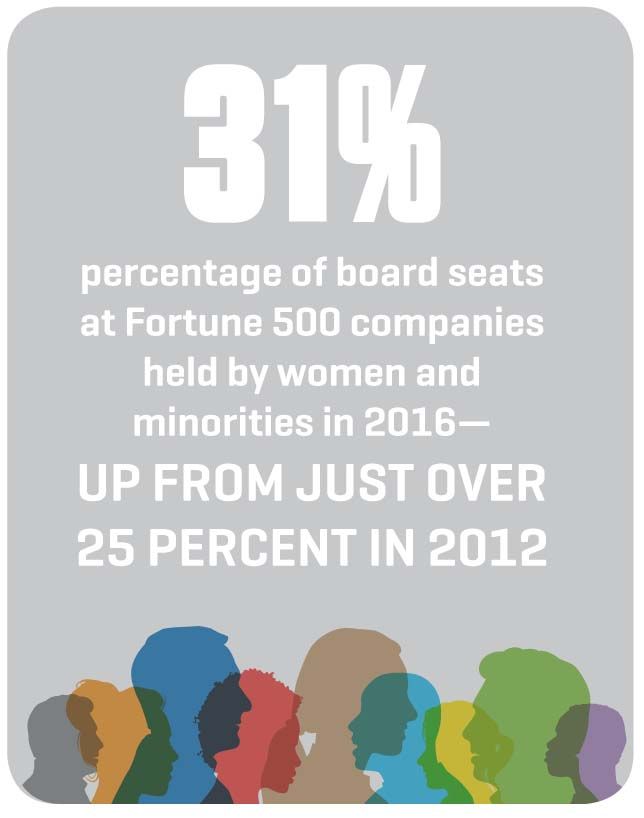“When you look at the progress of women on boards over the long haul, the index looks impressive and you can say, ‘Yes, we are making progress,’” says Deb Henretta, former global president of e-business at Procter & Gamble and current senior advisor at management consulting firm SSA. “But if you look at the compound annual growth rate that you see each year, it looks less exciting. And when you look at the last couple of years, it’s stagnant.”

Kesner agrees. “To be honest, I’ve been surprised that progress has been much slower than what I would have predicted years ago,” she says.
While there has been some movement for African-American women, who gained 19 seats since 2012, the increase in the number of board seats held by African-American men over the same four-year period was nearly flat, with just three seats added, says the Executive Leadership Council’s Parker.
“Collectively, looking at women and minorities, we are at an all-time high, but when you consider our collective spending power of about $4 trillion, when you look at Latinos, Asians, women and blacks, to have that few board seats represented is really disappointing,” he notes.
Why the disconnect? Experts point to five roadblocks hampering movement toward more gender and ethnically diverse corporate boards—and offer solutions to CEOs and chairmen seeking change about what can be done to break them down.
1) Problem: Lack of Buy-in. A PwC survey of 2,300 directors from 46 different countries found that when asked the question, “Do you believe that diversity on your board enhances company performance?” only 24% of men said yes, compared with 89% of women. That isn’t necessarily because men are discounting women, says Coco Brown, CEO and founder of Athena Alliance, a nonprofit that helps small and midsize companies find female executives to fill board seats.

In fact, Brown says she has received overwhelmingly positive feedback and support from male individuals at prospective corporate clients. But, perhaps not surprisingly, male directors are not as likely to be aware of the positive correlation, and they may not want to fix something they don’t perceive as broken. “They may not be tuned in as well as women are about the benefits of diversity. They may not be paying attention to it.”
Solution: Look at the numbers. Proponents of diversity at the boardroom level and beyond say the goal isn’t to achieve parity for its own sake, but rather to grow U.S. advantage in an increasingly competitive global market. As mentioned earlier in this article, an expanding body of data suggests a strong correlation between such diversity and a better bottom line. Catalyst, for example, found that companies with the most women board directors outperformed those with the least on both return on sales (by 16%) and return on invested capital (by 26%).
In the aforementioned update to its Principles of Corporate Governance to reflect the connection between diversity and performance, the Business Roundtable acknowledged such findings, asserting: “Diverse backgrounds and experiences on corporate boards, including those of directors who represent the broad range of society, strengthen board performance and promote the creation of long-term shareholder value.” The newly updated principles encourage boards to “develop a framework for identifying appropriately diverse candidates that allows the nominating/corporate governance committee to consider women, minorities and others with diverse backgrounds as candidates for each open board seat.”
2) Problem: Lack of Qualified Candidates. Solution: In fact, experts say, the notion that qualified female and ethnic/racial minority candidates for board positions can’t be found is simply a persistent myth. “Sometimes I will talk with people who want to get women on their board and they’ll say, ‘I can’t find them.’ And I don’t mean to be disrespectful here, but my answer is, ‘Look harder.’ There are a lot of women out there in C-suite and other leadership positions,” says Henretta.
One of the problems is that when a board seat opens up, sitting directors are often called on to put forward potential candidates, which leads to a vicious cycle. “Men are leveraging their networks,” says Brown. “So what I run into over and over again is not, ‘I love my old boys’ club and I want to keep the women out.’ What I hear is, ‘Honestly, Coco, I don’t know women.’ From a business/professional perspective, they leverage their executive networks, and those are still mostly men.”
Margot McShane of Russell Reynolds says that more boards are beginning to recognize that they have to go outside their comfort zone to deliberately seek out a diverse slate of candidates rather than relying on their own limited Rolodexes.
“The days of just networking at a board level seem to have passed for the more sophisticated clients,” she says. Those that put women on nominating and governance committees may have an edge because “women know women,” says Henretta, who, together with Kim Whitler at the Darden School of Business at the University of Virginia, has just completed research looking at not only women on boards, but specifically the small numbers of women on what she calls the “power committees,” such as nom/gov, compensation and audit.
3) Problem: Bias Toward Sitting or Retired CEOs. Solution: As noted earlier, many boards are still, as they have been for decades, more inclined to seek either sitting CEOs or retired CEOs who have experience on boards and are ready to tackle governance issues from day one. But that predilection may blind boards to other, better options given how few CEOs today are women and people of color. “If you start with that as the criteria, right away you have a problem,” says Miguel Quiñones, management professor at the Cox School of Business at Southern Methodist University and director of the school’s Latino Leadership Initiative. The traditional pipeline for CEOs and chairmen is not as robust as it could be, he says. “So you have to ask yourself, is that really the most important criterion today?”

Chief Executive Group exists to improve the performance of U.S. CEOs, senior executives and public-company directors, helping you grow your companies, build your communities and strengthen society. Learn more at chiefexecutivegroup.com.
0

1:00 - 5:00 pm
Over 70% of Executives Surveyed Agree: Many Strategic Planning Efforts Lack Systematic Approach Tips for Enhancing Your Strategic Planning Process
Executives expressed frustration with their current strategic planning process. Issues include:
Steve Rutan and Denise Harrison have put together an afternoon workshop that will provide the tools you need to address these concerns. They have worked with hundreds of executives to develop a systematic approach that will enable your team to make better decisions during strategic planning. Steve and Denise will walk you through exercises for prioritizing your lists and steps that will reset and reinvigorate your process. This will be a hands-on workshop that will enable you to think about your business as you use the tools that are being presented. If you are ready for a Strategic Planning tune-up, select this workshop in your registration form. The additional fee of $695 will be added to your total.

2:00 - 5:00 pm
Female leaders face the same issues all leaders do, but they often face additional challenges too. In this peer session, we will facilitate a discussion of best practices and how to overcome common barriers to help women leaders be more effective within and outside their organizations.
Limited space available.

10:30 - 5:00 pm
General’s Retreat at Hermitage Golf Course
Sponsored by UBS
General’s Retreat, built in 1986 with architect Gary Roger Baird, has been voted the “Best Golf Course in Nashville” and is a “must play” when visiting the Nashville, Tennessee area. With the beautiful setting along the Cumberland River, golfers of all capabilities will thoroughly enjoy the golf, scenery and hospitality.
The golf outing fee includes transportation to and from the hotel, greens/cart fees, use of practice facilities, and boxed lunch. The bus will leave the hotel at 10:30 am for a noon shotgun start and return to the hotel after the cocktail reception following the completion of the round.